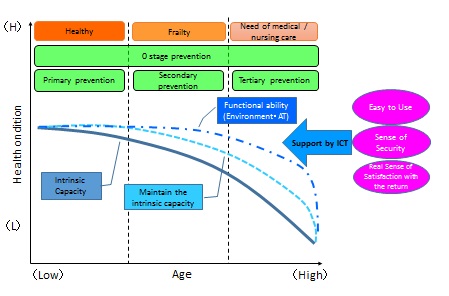Displaying present location in the site.
ICT Global Trend Part 5 No.6
Utilization of Healthcare data for Extension of healthy life expectancy (3/3)Improving functional ability with ICT
By Kazuko Yuma, Chief Fellow
Evolution of ICT greatly contributes to the wider utilization of healthcare data. Lately IoT (Internet of Things) devices such as sensors, wearables are spread in use in the area of healthcare enabling the easier collection of a wide variety of data while people are living a daily life. Artificial Intelligence (AI) is developed and evolved day by day and already is in practical use in the area of diagnosis support, study on new medical treatment, preventive care and development of new drugs. Some robots are also under development for the possible use in the healthcare. We can expect more wide and effective utilization of healthcare data with the assistance of the most advanced technology.
Priority on sense of satisfaction
The Institute of International Socio-Economic studies made active research and study in its Accessibility Study Group on the possible contribution of ICT to extend the healthy life expectancy and published the concept drawing of “the contribution of ICT for the extension of the healthy life expectancy“ based on the healthy ageing reported in WHO “World report on ageing and health”. In that report it is explained that the intrinsic capacity such as “walk”, “see” and “speak” is gradually deteriorated or declining in the progress of ageing, but the “functional ability” can be fostered and improved yet by ancillary tools such as glasses, wheel-chair and “environment” such as elevator. With assistance of ICT such as AI and IoT it is expected that the level of health promotion, earlier detection of diseases, control of chronic diseases, and the care prevention will be improved, thus making it possible that declining of the intrinsic capacity is minimized and the functional ability will be enhanced. As a consequence these efforts contribute that the healthy life expectancy is further extended.
It is, however, to be noted that the ancillary support by ICT should only be workable when the user is fully satisfied with the service from several aspects such as “Easy to Use” that the collection, analysis and feed-back of the data is automatically made without involving the user but of course subject to user’s prior consent, “Sense of Security ” that the access to the data is securely and properly monitored and controlled namely, who access the data, when the data is accessed and what data is accessed, and finally “Real sense of satisfaction with the results and return financially and non-financially” that incentivizes the user to accept the service.

the concept drawing of “The contribution of ICT for the extension of the healthy life expectancy
World top ranking advantage
Many countries in the world started to make best and effective use of healthcare data so that the healthy life expectancy is extended and that the aged people live longer life in active and healthy conditions, and that the healthcare cost moderated and also that healthcare industry is leveraged.
In Japan in the Ordinary Diet session in 2017 the draft law entitled as "Law concerning the anonymously adjusted medical data to be used for research and development in the specific medical field (in short, the draft of medical foundation for next generation) was debated, if resolved, it will create the foundation and system that medical data is utilized safely and smoothly while the individual privacy is properly secured.
The next generation health and medical system will be in operation in 2020 as aplatform to utilize fully and safely medical ID and data.
Japan should take advantage of being the world longest healthy life expectancy to establish the leading position in the gloal healthcare market. For that the public-private partnership is definitely required.